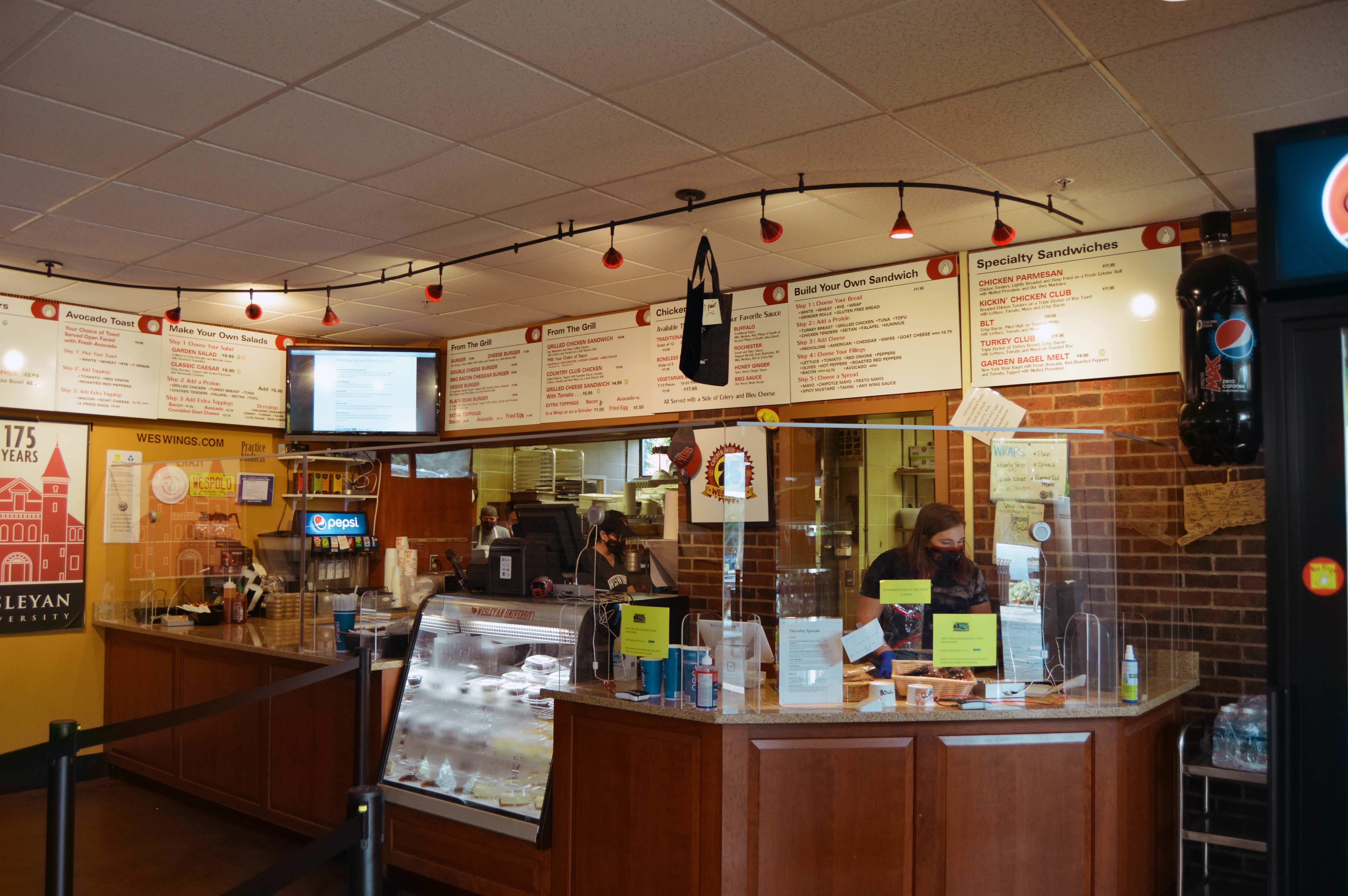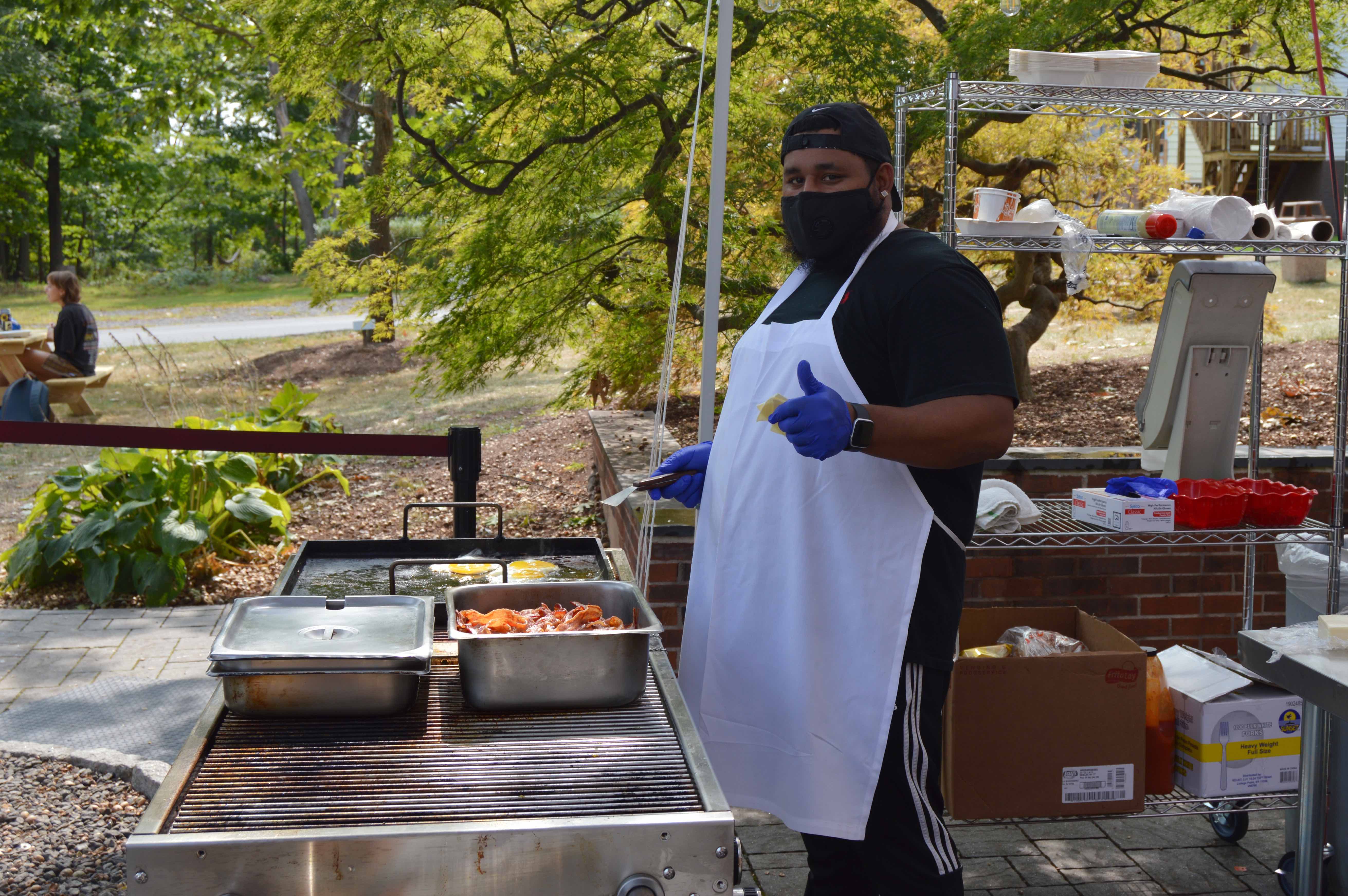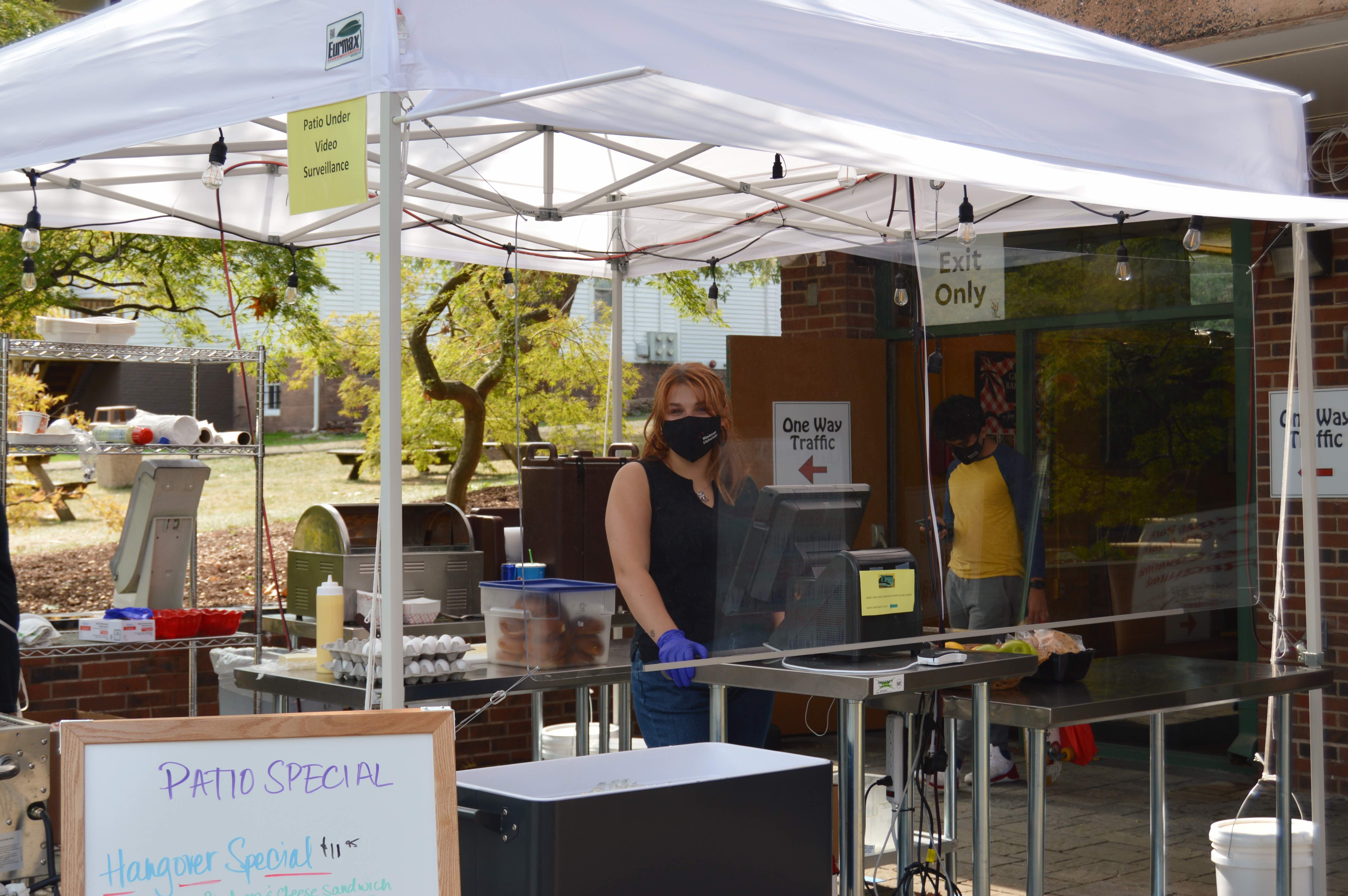
c/o Sarah Linsly, Contributing Photographer
WesWings (’Swings) and Red & Black Cafe (RBC) have substantially altered their protocols in order to safely serve customers during the COVID-19 pandemic. Gone are the days of cash, indoor dining, and crowded lines. Plexiglass has gone up, social distancing markers have been spray-painted onto the pavement, and disposable to-go containers have replaced bowls and plates. Staff have their temperature checked and logged at the beginning of each shift, and the number of employees per shift has been reduced. Customers and employees alike are masked and distanced, and sanitizer flows freely.
Student and non-student employees are tested regularly, as part of the University’s partnership with the Broad Institute. Additionally, ’Swings and RBC are only open to individuals participating in the testing program: students, staff, and faculty. In the past, both locations have been open to the public and the Middletown community at large, although the majority of their business has always been University derived.
On Wednesday, Sept. 16, an update was posted to the ’Swings and RBC website, announcing that one employee had tested positive for COVID-19.
“It has been determined that the employee did not have any close contact with any other staff member,” the update reads. “The person is isolating and Wesleyan contact tracers have or will be notifying any people determined to have had close contact…. In addition, this morning we have completed an extensive deep cleaning of WesWings.”
Swings remains open, and the update noted that all staff are continuing to be tested twice weekly.
Karen Kaffen-Polascik and Ed Thorndike ’89, co-founders and owners of both Swings and RBC, told The Argus that the employee had called Kaffen-Polascik on the evening of Tuesday, Sept. 15 to tell her they had tested positive for COVID-19 and to have their shifts covered. Kaffen-Polascik and Thorndike then notified all ’Swings staff and consulted with the Davidson Health Center, the City of Middletown, and the city’s Department of Health. Following a conversation with the Medical Director of the Davison Health Center Dr. Tom McLarney, they felt confident that the risk of further infection was low, and deep cleaned the restaurant. At the time of publication, the employee was reportedly asymptomatic and doing well.
“We will continue to be vigilant in our distancing practices for staff and customers and will not let our guard down,” Kaffen-Polascik and Thorndike wrote in an email to The Argus. “We understand there may be positive cases, but we want to ensure our safety measures are enforced to prevent the spread to other employees in our restaurant.”
Apart from this new development, things are definitely different at ’Swings and RBC.

c/o Sarah Linsly, Contributing Photographer
Although the tables outside ’Swings have been consistently full of hungry Cardinals, the inside is far quieter. Music is no longer played, and the mealtime hubbub has been relegated to the outdoors. There’s also less small talk.
“It’s a little different on [our] side because we’re missing the real interaction with the students and calling the names and the chit chat at the counter,” Kaffen-Polascik said.
While a lot of the adaptations, like the plexiglass and distancing, will probably not continue post-pandemic, there is one change that will: the introduction of the patio grill.
“The patio grill is something that we realized that…that’s something that, you know, we would probably definitely bring out normally after spring break to do things,” Thorndike said. “Or for the first couple [of] months in the fall. I think that’s definitely something that we will keep, you know, long after this is all over, hopefully.”
At RBC, the vibe of the previously popular study spot has shifted. Students no longer spend hours making their way through their readings and essays and coffees. Mobile ordering allows for quick pickup, and tables and chairs have been roped off in the corner.
Before the ’Swings employee tested positive, the employees who spoke to The Argus said that they felt safe working this semester with the new guidelines in place.
“Karen and Ed have made sure that everybody is safe,” Terra Ganey ’21, a ’Swings employee since 2018, said. “And also, if anybody felt uncomfortable, anytime, there’s no obligation to work. They absolutely would not make anybody come in if they did feel like it was the safest environment possible.”
Even after the COVID-19 case, student workers said they generally felt safe and not at any more at risk than the general University population.
“I honestly think that I don’t feel any more at risk for COVID than I did not working there,” Allie Godwin ’23, who started working at RBC this semester, said.
Many students chose to return—or to take new positions—at ’Swings and the RBC because University budget cuts and COVID-19 restrictions left them with fewer job options and fewer available hours at other jobs.
“I had a job last semester working at the CFA costume shop, and I still am an employee there, but I wasn’t sure what the hours were going to be like this semester,” Godwin said. “I didn’t know what the Theater Department was doing, and so much of our work is dependent on thesis shows, so if those were all canceled I didn’t know what I would be doing.”
Stephanie Andrasik, who has worked at WesWings since 2003, said she didn’t have reservations about returning to work.
“I definitely feel safe because all staff are being tested, all wearing masks, and everyone is maintaining social distancing,” Andrasik wrote in an email to The Argus.
However, two (non-student) part-time employees are not working due to personal health concerns and are currently on furlough, according to Kaffen-Polascik and Thorndike.
Staff said they felt that customers were doing a good job with the new rules.
“By and large, everyone’s generally doing the right thing to be safe,” Thorndike said. “People are keeping [their] distance. Everyone is wearing their masks. There’s no one standing too close to one another.”
Swings and RBC, both of which closed early last year after the University switched to remote learning in March, were undeniably impacted financially by the pandemic. Moreover, the cost of PPE for their staff, along with more general adaptations to the restaurant for protections, is significant.
“We’re fortunate that we’ve been around a long time, and we have the means to be able to sort of manage through that or to get through that until we got to open again,” Thorndike said. “We’ve easily been spending tens of thousands of dollars more on things that we never would have spent money on, you know just from [sanitizer to containers].”
But, according to Thorndike and Kaffen-Polascik, things are going better than they anticipated.

c/o Sarah Linsly, Contributing Photographer
“You know, business…compared to last year [is] up for the first five days at both places considerably,” Thorndike said. “We’re encouraged because we didn’t know what to expect with fewer students on campus and how the changes were going to affect us. But overall, we’re busy. And so we’re encouraged that, you know, whatever losses that we’ve incurred and whatever extra expenses we’ve had over time…we know that we’re going to recover from that.”
In order to help combat the financial hit of COVID-19 on their two businesses, Kaffen-Polascik and Thorndike have started selling masks, which are available for 12 points at both locations, or for $15 online.
“I don’t like the look of the medical masks,” Kaffen-Polascik said. “Especially when I’m eating, [it] reminds me of being in a hospital setting.”
However, in general, there are some things that have stayed the same despite the pandemic. The same food is on the menu, students bask in the sun at the wooden picnic tables outside, and Ed and Karen direct the throngs with a conductor’s grace.
“It feels good to be back,” Thorndike said.
Annika Shiffer-Delegard can be reached at ashifferdele@wesleyan.edu
Sophie Griffin can be reached at sgriffin@wesleyan.edu